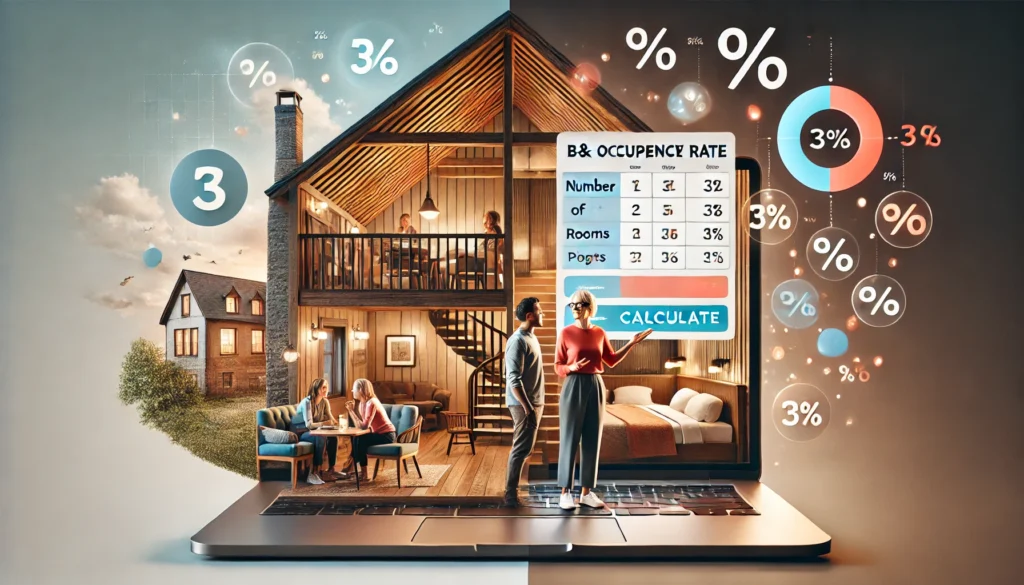Occupancy Rate Calculator for your B&B – FREE Online Tool
B&B Occupancy Rate Calculator
How to use the Occupancy Rate Calculator
Step 1: Gather Your Data Before using the calculator, you’ll need to know:
- The total number of rooms in your B&B
- The number of occupied room nights for the period you’re calculating
- The time period (in days) you’re calculating for
Step 2: Enter the Number of Rooms
- Find the field labeled “Number of Rooms”
- Type in the total number of rooms your B&B has
Step 3: Enter Occupied Room Nights
- Locate the field labeled “Occupied Room Nights”
- Enter the total number of nights rooms were occupied during your chosen period
- For example, if you had 5 rooms occupied for 3 nights, this would be 15 occupied room nights
Step 4: Enter the Time Period
- Find the field labeled “Time Period (in days)”
- Enter the number of days for the period you’re calculating
- For example, if you’re calculating for a month, you’d enter 30 or 31 (depending on the month)
Step 5: Calculate the Occupancy Rate
- After entering all the required information, click the “Calculate Occupancy Rate” button
Step 6: View the Result
- The calculator will display the occupancy rate as a percentage below the form
- For example: “Occupancy Rate: 75.00%”
Step 7: Interpret the Result
- The percentage shown is your occupancy rate for the given period
- 100% would mean every room was occupied every night of the period
- Lower percentages indicate rooms that were unoccupied during the period

How knowing the Occupancy Rate can help your B&B Business
An occupancy rate is a crucial metric for any accommodation business, including B&Bs. It shows the percentage of available rooms that are occupied over a given period. This information can help B&B owners in several ways:
- Performance evaluation:
The owner can use this calculator to track their B&B’s performance over different time periods. For example, they might calculate occupancy rates for:- Different months to identify high and low seasons
- Weekdays vs. weekends
- Before and after implementing new marketing strategies
- Pricing strategy:
By understanding their occupancy rates, owners can adjust their pricing:- If occupancy is consistently low, they might consider lowering prices or offering promotions
- During high-occupancy periods, they could potentially increase rates
- Capacity planning:
The calculator can help owners decide if they need to expand or reduce their room offerings:- Consistently high occupancy might suggest an opportunity to add more rooms
- Low occupancy might indicate a need to repurpose some rooms or reduce capacity
- Marketing effectiveness:
After running marketing campaigns, owners can use the calculator to see if there’s an improvement in occupancy rates. - Seasonal planning:
By calculating occupancy rates for different seasons, owners can plan ahead for:- Staff scheduling
- Maintenance and renovations during low seasons
- Special events or packages to boost occupancy in slower periods
- Industry benchmarking:
B&B owners can compare their occupancy rates with industry averages to see how they’re performing relative to competitors. - Financial forecasting:
Occupancy rates are crucial for projecting future revenue and making business decisions.
Example
Let’s say a B&B has 10 rooms and the owner wants to calculate the occupancy rate for July (31 days):
- They would enter:
- Number of Rooms: 10
- Time Period: 31 days
- Occupied Room Nights: Let’s say they had 248 occupied room nights in total for July
- The calculator would then show: Occupancy Rate: 80.00% (Calculation: (248 / (10 * 31)) * 100 = 80.00%)
- The owner can interpret this as follows:
- Their B&B was 80% full during July
- There’s still some room for growth, but it’s a strong performance
- They might consider slight price increases for next July if this is higher than their usual occupancy
- They should examine what made July successful and try to replicate it in other months
By regularly using this calculator and tracking the results, B&B owners can gain valuable insights into their business performance and make data-driven decisions to improve their operations and profitability.



